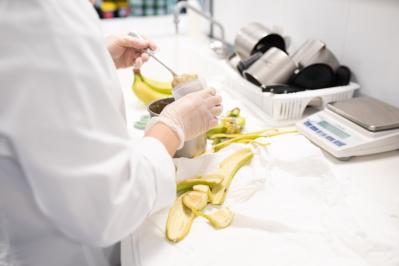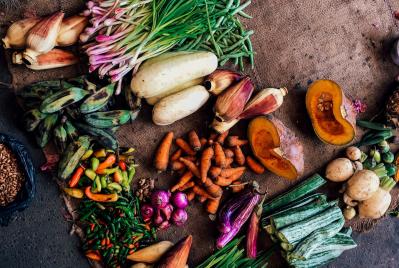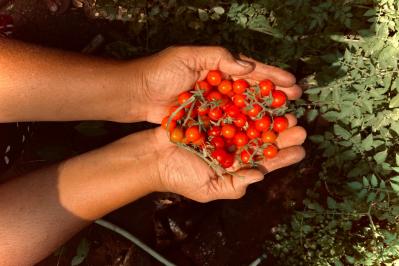
Analysis of organic products
The market share of organic food has grown continuously in recent years, although the market share of organic fruit and vegetables varies greatly depending on the region, season and product. This is also due to the increasingly conscious purchasing decisions of consumers, who take factors such as environmental protection and animal husbandry into account when choosing their food.
In the EU, for example, the EU Organic Regulation (EU) 2018/848 lays the foundation for organic farming and food production in the European Union. It lays down the standards and rules for the production, processing, labelling and inspection of organic products with the aim of protecting consumers from being misled and ensuring fair competition between organic producers.
Challenges for producers and distributors of organic products
The accredited laboratories of the Tentamus Group offer a wide range of services that can support manufacturers and distributors of organic products in overcoming the challenges posed by the EU Organic Regulation.
A key challenge is compliance with production standards that are prescribed for the organic production of food. These include, for example, restrictions on the use of certain substances, requirements for animal husbandry and feeding as well as detailed documentation obligations. Organic food must be free from undesirable substances such as pesticides or genetically modified organisms, which can be verified by appropriate laboratory tests.
Further challenges for distributors of organic food arise from the strict requirements for labeling and advertising organic food or ensuring traceability along the entire supply chain in order to be able to react quickly if problems arise. Here too, the Tentamus Group laboratories can provide support in the form of advice, training and analytical tests.

Necessary tests for the analysis of organic products
Depending on the organic product, different product-specific analyses and procedures may be used. In principle, the analyses do not differ in methodology from the analyses of food from conventional agriculture.
Pesticides
The use of synthetic pesticides is prohibited in organic farming.
However, pesticides may inadvertently drift from conventional agricultural land into and onto plants intended for the production of organic products.
All producers of organic products are obliged under the EU Organic Farming Regulation to take appropriate precautionary measures to protect their products from contamination by synthetic pesticides. Environmental sample analyses, for example, can help to check the suitability of cultivation areas for organic food or to prove the use of pesticides and thus identify possible sources of contamination.
Using a pesticide combination method, the accredited laboratories of the Tentamus Group offer the possibility of testing a sample for over 900 pesticides.
Analysis for residues and contaminants
A comprehensive range of methods, which includes analyses such as gas chromatography (GC), liquid chromatography (LC), high-performance liquid chromatography (HPLC), mass spectrometry and high-resolution mass spectrometry (HRMS), can be used in residue analysis to rule out the presence of undesirable substances in organic products. The tests are dependent on the organic product and do not differ from the tests used to analyse conventionally produced food.
The following residues and contaminants can be detected, among others:
- Mycotoxins
- Pyrrolizidine, quinolizidine and tropane alkaloids
- Dioxins, PCBs and PAHs
- MOSH / MOAH
- Veterinary drug residues
- Nitrate and nitrite
- Acrylamide, furan
- MCPD ester R
- QAV, chlorate, perchlorate
Microbiological analysis
Depending on the type of organic product to be analysed, various tests are used for microbiological quality assurance in order to protect the consumer from health risks and to guarantee product quality. In principle, the microbiological tests do not differ from those used for quality assurance of food from conventional agriculture. For example, organic food is analysed for the following parameters:
- Total bacterial count
- Yeasts and moulds
- Bacillus cereus, staphylococci, etc.
- Salmonella, STEC / VTEC, etc.
- Multi-resistant germs (ESBL / MRSA)
- Hepatitis A viruses, noroviruses
Analysis for GMOs
The EU Organic Regulation sets very strict requirements for organic products with regard to genetically modified organisms (GMOs). The use of GMOs and products made from them is strictly prohibited in the production and processing of organic products at all stages. For example, animals in organic farming may only be fed with GMO-free feed.
Producers of organic products must therefore take comprehensive measures to avoid contamination of their products with GMOs. These measures must be documented.
The risk of contamination of organic products with GMOs is particularly high in North and South America due to the high proportion of GMO crops (especially soya, maize and cotton) and less stringent regulations. Unintentional spread of GMOs to neighbouring organic fields can occur through wind, insects or other natural transmission routes.
For this reason, it is important for organic producers in the EU to be aware of the increased risk of contamination in products from North and South America and to look for products with appropriate certifications and controls.
The Tentamus Group laboratories can help organic producers to meet the requirements by providing GMO analyses, advice on GMO risks and appropriate control measures and quality assurance support.
Nutritional value analyses & Labeling tests
Labeling testing of organic products ensures that the labeling complies with current food law regulations and thus protects the interests of consumers. The nutritional analyses offered by the Tentamus Group laboratories provide the necessary data for the creation of correct nutritional labeling, which is required by law for many products.
The labelling includes information such as
- Product name
- List of ingredients
- Net quantity
- Nutritional information
- Best before date
- Additives
Tentamus Group offers labeling tests according to national and international standards.
Audits and certifications
The Tentamus Group can carry out independent audits to verify compliance with organic standards and guidelines in the manufacturer's production process and to identify weaknesses and potential for improvement. Supplier audits are also possible to ensure that they comply with the organic standards. Supplier audits are particularly important in organic farming, as the quality of the raw materials has a major influence on the quality of the end product, especially in the organic sector.

Sample shipment
for the analysis of organic products
The Tentamus Group offers various sample delivery options to ensure that your organic products are analyzed quickly and reliably. These include postal delivery and parcel service, as well as personal delivery to one of our laboratories. There is also the option of using the Tentamus Group's practical collection service within Germany.

Relevant legal bases and directives:
- New EU Organic Basic Regulation (EU) 2018/848 of June 17, 2018 (consolidated version)
- Commission Implementing Regulation (EU) 2021/1165 of 15 July 2021 (Consolidated version) (Authorization of certain products and substances for use in organic production)
- Organic Farming Act
- Organic labeling law
food@tentamus.com
+49 30 206 038 230
Overview of the Tentamus Group laboratories offering analyses of organic products
The following laboratories from the Tentamus Group offer the analysis of organic products:
This could also be of interest to you:
- Analyses
Residue analysis
Microbiological analysis
Chemical analysis
- Product category
Cereals
Fruits and vegetables
Meat & sausage products
Milk & dairy products
Eggs
- Other Services